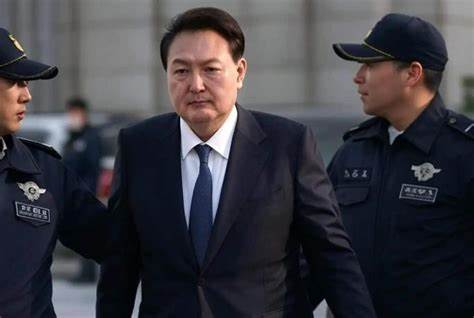by Temitope Oladeji
4/4/2024
South Korea’s Constitutional Court has unanimously ruled to remove President Yoon Suk-yeol from office following his controversial declaration of martial law last year.
Announcing the verdict on Friday morning, acting Chief Justice Moon Hyung-bae systematically dismissed Yoon’s justifications for imposing martial law.
Justice Moon stated that the president had overstepped his constitutional authority by deploying military forces onto the streets of the capital in December.
“The defendant mobilized military and police forces to dismantle the authority of constitutional institutions and infringed upon the fundamental rights of the people. In doing so, he abandoned his constitutional duty to uphold the constitution and gravely betrayed the trust of the Korean people,” Moon declared.
The judge further emphasized that such actions were unlawful and unconstitutional, adding that the negative consequences of Yoon’s conduct warranted his removal.
“The benefit of restoring constitutional order through removal from office outweighs the national costs associated with the dismissal of a sitting president,” he stated.
President Yoon had justified his declaration of martial law by claiming that anti-state and North Korean forces had infiltrated the government.
However, testimony from senior military and police officials contradicted his claims. According to them, Yoon had ordered security forces to detain opposition politicians and prevent the National Assembly from voting to overturn his military rule order.
The National Assembly had voted to impeach Yoon on December 14, but his formal removal required the approval of the Constitutional Court, which has now upheld the impeachment.
Following the ruling, Yoon accepted the court’s decision, addressing the nation in a statement:
“Dear citizens, it has been a great honor to work for the Republic of Korea. I am deeply grateful to all of you who have supported and cheered for me, despite my many shortcomings,” he said.
The government now has 60 days to hold a new presidential election. Until then, acting President Han Duck-soo will continue leading the country.
President Yoon also faces potential criminal investigations, including charges of abuse of power.
While in office, Yoon was shielded from prosecution except for treason. With his removal, the door has been opened for further legal scrutiny.
In addition to legal consequences, Yoon has been stripped of all presidential privileges, including official aides, security detail, and a pension amounting to 95% of a president’s salary.
He is also required to vacate the presidential residence and will not be granted a burial at the national cemetery.
The court’s ruling was met with mixed reactions. While critics of Yoon cheered the decision, his supporters, mostly older demonstrators, voiced subdued discontent, with murmurs of “rigged election” and “corruption” among them.
South Korea, though now a stable democracy, has a history of military-backed dictatorships from 1948 to 1987.
The nation’s transition to democracy was marked by mass protests that led to the end of 17 years of martial law. Decades later, memories of authoritarian rule still linger among many South Koreans, reinforcing the importance of constitutional order and democratic governance.

